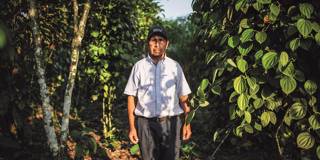Managing the climate crisis will require reducing the carbon footprint of our food and agricultural systems in the years ahead. To succeed, we should start focusing less on the interests of corporations, and more on the needs of farmers.
NEW DELHI – One out of every nine people goes to sleep hungry. The reason is not insufficient food supplies. It is that our food systems have made basic nutrition unaffordable and inaccessible. Worse, even though an estimated one-third of food is wasted, policymakers remain focused on boosting agricultural production – usually in ways that result in a larger portion of subsidies flowing to a handful of companies, rather than to support farmers.
The single-minded pursuit of agricultural productivity gains and industrial animal production first led to the widespread cultivation of virgin lands, followed by intensification of farming in which water, chemicals, and antibiotics are deployed with abandon. On top of these practices has come the re-engineering of life itself, through genetic modification.
Since 1970, these processes have contributed to a reduction in the populations of wild mammals, birds, amphibians, and reptiles by an estimated 68%, on average. With such alarming biodiversity loss, the circle of life is slowly grinding to a halt.

NEW DELHI – One out of every nine people goes to sleep hungry. The reason is not insufficient food supplies. It is that our food systems have made basic nutrition unaffordable and inaccessible. Worse, even though an estimated one-third of food is wasted, policymakers remain focused on boosting agricultural production – usually in ways that result in a larger portion of subsidies flowing to a handful of companies, rather than to support farmers.
The single-minded pursuit of agricultural productivity gains and industrial animal production first led to the widespread cultivation of virgin lands, followed by intensification of farming in which water, chemicals, and antibiotics are deployed with abandon. On top of these practices has come the re-engineering of life itself, through genetic modification.
Since 1970, these processes have contributed to a reduction in the populations of wild mammals, birds, amphibians, and reptiles by an estimated 68%, on average. With such alarming biodiversity loss, the circle of life is slowly grinding to a halt.